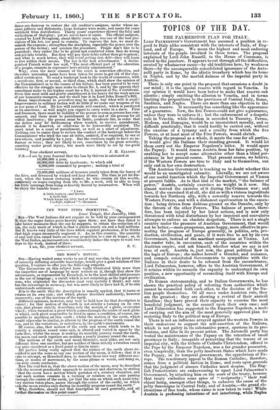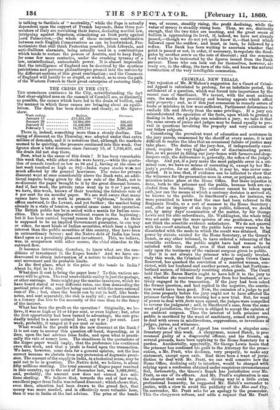TOPICS OF THE DAY.
THE PALMERSTON PLAN FOR ITALY.
Loan PetarensTox's Government has assumed a position in re- gard to Italy alike consistent with the interests of Italy, of Eng- land, and of Europe. We mean the highest and most enduring interests of the people involved in those terms. The proposal explained by Lord John Russell, to the House of Commons, is suited to the juncture. It appears to cut through all the difficulties, oreateeby whatsoever cause—by old traditions here, by weakness there—by the unconquerable consolidated ignorance of the Anto- nelli party in Rome, by the idiotic treachery which has its home in Naples, and by the morbid dulness of the imperial party in Austria.
There is only one point in the proposal that occasions a doubt in our mind ; it is the special reserve with regard to Venetia. In our opinion it would have been better to make that reserve sub silentio ; simply omitting the allusion to Venetia, and in terms limiting the propositions to the provinces of Central Italy, Rome, Sardinia, and Naples. There are more than one objection to the express reserve. It necessarily has something like the appearance of a guarantee. Now, the five Powers could not give a guarantee, unless they were to enforce it ; but the enforcement of a despotic rule in Venetia, while freedom is accorded to Tuscany, Parma, Modena, and Romagna, would be so inconsistent morally, and so difficult practically, that it could hardly be carried out, without the exercise of a tyranny and a cruelty from which the five Powers, or at least most of the Five Powers, would shrink.
Taking the proposal as a whole, it meets the case for all parties. It would give the Italians their standing ground. It would let them carry out the Emperor Napoleon's letter. It would spare the Papacy. It would rescue Austria from her false position, by enabling her to accept some alternative other than a blind per- sistence in her present course. That present course, we believe, if the Western Powers are true to Italy and to themselves, can only end in her own destruction.
The Austrian Government is teaching us to doubt whether this would be an unmitigated calamity. Literally, we are not aware of one useful function which the Imperial Government at Vienna at present fulfils. As to that idol of the market, " the balance of power," Austria, certainly exercises no weight in it now. She almost waived the exercise of it during the Crimean war ; and then, if she exercised it at all, she did so with a vicious ingratitude towards her Northern ally, with a cowardly reserve towards the Western Powers, and with a dishonest equivocation in the execu- tion ; being driven from dubious ground on the Danube, only by the threats of the other Powers. The balance of power, there- fore, has been injured by her latest actions, and is now only threatened with total disturbance by her impotent and convulsive attempts to enforce an obsolete despotism. There is not a single country under the pressure of Austrian Government, that would not be better,—more prosperous, more happy, more effective in pro- moting the urogress of Europe generally, in politics, arts, pro- duction, civilization, and peace, if it were free to act by its own Government, instead of the martinet usurpation at Vienna. Let the reader take, in succession, each of the countries within the Austrian empire, and ask himself, whether what we say is not true of each. Austria is, just now, the great political flaw in the logic of Europe ; she makes herself a blunder, and nuisance, and compels constituted Governments to sympathize with the Italians in their desire to be released from the encumbrance. Lord Palmerston, however, offers to the Austrian Government, if it retains within its councils the capacity to understand its own position, a new opportunity of reconciling itself with Europe and civilization.
To Roman statesmanship, and to Italian Governments, he has shown the practical policy of referring from authorities which cannot be reconciled with each other, to the decision of the Ita- lian people themselves. Of all races under Austrian rule, they are the greatest ; they are showing a revival of their ancient faculties ; they have proved their capacity to exercise the most beneficial judgment, in the council upon their own case ; and Lord Palmerston has suggested to the Emperor Napoleon, a mode of carrying out the aim of the most generally approved plan for restoring Italy to the political map of Europe. There is not an influence arrayed against the western Powers in
their endeavour to support the self-assertion of the Italians, which is not paltry in its substantive power, spurious in its pro- fessions, and false in its present action. The Antonelli party has vested the maintenance of the Papacy on the retention of small provinces in Italy ; incapable of perceiving that the tenure of an imperial city, with the tribute of Catholic Christendom, offered to the Pope by the Emperor Napoleon, was a far grander possession, even temporally, than the petty insolvent States which have made the Papacy, in its temporal government, the opprobrium of Eu- rope. The reactionary appeal to the Roman Catholicr, therefore, comes from a political faction in Rome, and rests upon grounds that the judgment of sinoere Catholics must despise. The Eng- lish Protectionists are endeavouring to upset Lord Palmerston's Government, by attacking him on the score of the treaty, because that treaty embodies some spice of " reciprocity ; " their real object being, amongst other things, to subserve the cause of the petty Sovereigns in Central Italy, and of Austria,--the grand ob- structives of free trade, whose name is now taken in vain ! While Austria is professing intentions of not interfering, while Naples
is talking to Sardinia of " neutrality," while the Pope is actually dependent upon the support of French bayonets, those three per- secutors of Italy are recruiting their forces, declaring martial law, intriguing against Napoleon, stimulating an Irish party against Lord Palmerston,—the whole of these monstrous combination between such English Conservatives as can be hoodwinked, Pro- tectionists that still think Protection possible, Irish Liberals, and anti-Gallican alarmists, being actually used in a combinations which tends to restore the powers of Austria, and to keep Italy, for some few more centuries, under the crushing tyranny of a low, unintellectual, unteaehable power. It is almost impossible that the intelligence of England can be deceived by the spurious patriotisms and perverse philanthropies pressed into the service by the different sections of this great combination ; and the Commons of England will hardly be so stupid, so wicked, as to cross the path of the Western Powers in their great enterprise of restoring Italy.































 Previous page
Previous page